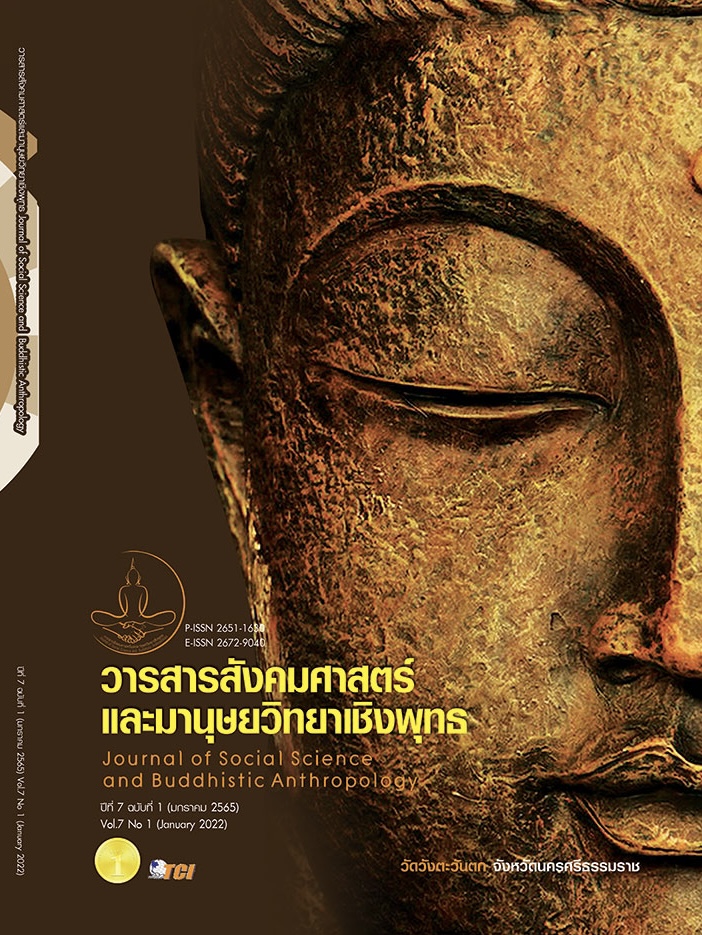VOTING RIGHTS OR ELECTION DUTIES: CONSTITUTION OF THE KINGDOM OF THAILAND
Keywords:
Vote Right, Election Duties, Constitution of The Kingdom of ThailandAbstract
This article discusses the election of the people to exercise their right to vote for representatives. To act on behalf of governing each level of the country. Democratic elections must be free. Allows freedom to make decisions for both applicants and voters. It must be pure and fair, without guidance or compulsion. People have the power to rule the country, but in today's society, it is impossible for all people to run the country at the same time. Therefore, it is necessary to elect representatives to run the country and exercise power on behalf of the people. Because sovereignty belongs to all people, their choice is for the public interest, social support, and policies to meet the needs of candidates or political parties, elected representatives. At present, there is a problem that the election is from the constitutional study of the kingdom of Thailand's Right to vote. Later, there was a change when the Constitution of the Kingdom of Thailand BE 2540 stipulated that elections were a duty that the people had to comply with. by the state giving rights to the people, having the duty to exercise their right to vote in elections. At present, the Constitution of the Kingdom of Thailand B.E. 2560 B.E. has introduced the principle of rights and liberties. Contains provisions on the rights and liberties of the Thai people as a guarantee that the State will recognize and protect the rights and freedoms of the people and was enacted as the supreme law in governing the country. Stipulating that sovereignty belongs to the Thai people's constitution is, therefore, like a pillar as a mechanism for organizing, determining the structure of state power, and strengthening the governance for developing and resolving the country's crises.
References
กรุงเทพธุรกิจ. (2564). ส่องประเทศที่มีระบบเลือกตั้ง น่าเชื่อถือที่สุดในโลก. เรียกใช้เมื่อ 15 มีนาคม 2564 จาก https://www.bangkokbiznews.com/news/detail/869692
กษมา เดชรักษา และชุติพงศ์ สมทรัพย์. (2561). หน้าที่ของปวงชนชาวไทยในรัฐธรรมนูญ: สถานะและความผูกพันทางกฎหมาย. พิฆเนศวร์สาร, 14(2), 193-210.
กองบรรณาธิการ สำนักกฎหมาย. (2554). หลักสิทธิและเสรีภาพตามรัฐธรรมนูญแห่งราชอาณาจักรไทย : แนวความคิดและภาคปฏิบัติ. จุลนิติ, 8(1), 1-44.
คณะกรรมการศึกษาแนวทางการแก้ไขเพิ่มเติมรัฐธรรมนูญ สำนักงานเลขาธิการสภาผู้แทนราษฎร. (2549). แนวทางการแก้ไขเพิ่มเติมรัฐธรรมนูญเรื่องสิทธิ เสรีภาพ และหน้าที่ของชนชาวไทย. กรุงเทพมหานคร: สำนักงานเลขาธิการสภาผู้แทนราษฎร.
คณะอนุกรรมการประชาสัมพันธ์และสำรวจความคิดเห็นของประชาชน. (2560). สรุปสาระสำคัญ รัฐธรรมนูญแห่งราชอาณาจักรไทย โครงการเสริมสร้างความรู้ ความเข้าใจรัฐธรรมนูญแก่สื่อมวลชน. กรุงเทพมหานคร: คณะอนุกรรมการประชาสัมพันธ์และสำรวจความคิดเห็นของประชาชน.
จันทรานุช มหากาญจนะ. (2559). การเมืองเปรียบเทียบ กรอบทฤษฎีพื้นฐานเพื่อการวิจัย. กรุงเทพมหานคร: โรงพิมพ์รัตนไตร.
ทศพล ทรรศนกุลพันธ์ ประชาไท. (2564). หน้าที่ในการใช้ “สิทธิเลือกตั้ง” กับการเสียสิทธิบางประการ. เรียกใช้เมื่อ 16 กุมภาพันธ์ 2564 จาก https://prachatai.com/journal
ธีรยุทธ สมตน. (2555). ปัญหาทางกฎหมายเกี่ยวกับการเพิกถอนสิทธิเลือกตั้ง. วารสารรามคำแหง ฉบับนิติศาสตร์, 1(2), 78-92.
บรรเจิด สิงคะเนติ. (2547). หลักพื้นฐานของสิทธิเสรีภาพ และศักดิ์ศรีความเป็นมนุษย์ ตามรัฐธรรมนูญ พ.ศ. 2540. (พิมพ์ครั้งที่ 2). กรุงเทพมหานคร: วิญญูชน.
พิสิษฐ์ วงศารัตน์ศิลป์. (2560). ความคิดเห็นของประชาชนในการปกครองระบอบประชาธิปไตย ในเขตอำเภอเมืองนนทบุรี จังหวัดนนทบุรี. วารสารดุษฎีบัณฑิตทางสังคมศาสตร์, 7(1), 190-202.
ราชกิจจานุเบกษา. (2560). รัฐธรรมนูญแห่งราชอาณาจักรไทย พุทธศักราช 2560. เล่ม 134 ตอนที่ 40 ก (6 เมษายน 2560). หน้า 13.
ราชบัณฑิตยสถาน. (2538). พจนานุกรมไทยฉบับราชบัณฑิตยสถาน พ.ศ. 2525. กรุงเทพมหานคร: อักษรเจริญทัศน์.
ลิขิต ธีรเวคิน. (2549). การมีส่วนร่วมทางการเมืองของประชาชนตามรัฐธรรมนูญ. วารสารสถาบันพระปกเกล้า, 4(1), 20-33.
สถานเอกอัครราชทูตไทย ณ กรุงวอชิงตัน. (2564). การเลือกตั้งนอกราชอาณาจักร. เรียกใช้เมื่อ 14 มีนาคม 2564 จาก https://thaiembdc.org/th
อมร รักษาสัตย์ และคณะ. (2539). ประชาธิปไตย : อุดมการณ์หลักการ และแบบอย่างการปกครองหลายประเทศ. กรุงเทพมหานคร: จุฬาลงกรณ์มหาวิทยาลัย.
Dahl, R. A. (1971). Polyarchy: Participation and Opposition. New Haven: Yale University Press.
Samuel P. Huntington. (1991). The Third Wave: Democratization in the Late Twentieth Century. United States: University of Oklahoma Press.
Uwanno, B. (2001). Good Governance in the Thai Society. Bangkok: Thailand National Defence College.
WeWatch Thailand. (2564). การเลือกตั้งในประเทศไทย. เรียกใช้เมื่อ 14 กุมภาพันธ์ 2564 จาก https://wewatchthailand.org/data
Downloads
Published
How to Cite
Issue
Section
License
Copyright (c) 2022 Journal of Social Science and Buddhistic Anthropology

This work is licensed under a Creative Commons Attribution-NonCommercial-NoDerivatives 4.0 International License.









